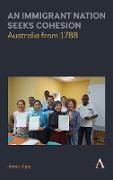- Start
- An Immigrant Nation Seeks Cohesion
An Immigrant Nation Seeks Cohesion
Angebote / Angebote:
An Immigrant Nation Seeks Cohesion' is based on current events and developments in Australia and seeks to illuminate them using historical and contemporary issues. It is not a formal or chronological 'history book'. Its sources are soundly based on the scholarship of existing history books. The transformation of Australia into a complex multicultural society comparable to the United States or Canada has not been fully dealt with by most conventional historians or taught extensively in schools and universities. Many conservative scholars either ignore this or even deplore the changes which have become so noticeable since the 1950s.The most important of these changes has been the decline and virtual disappearance of the British Empire from the Asian regions and the growth of dozens of political powers and systems previously only subject to European control. These changes have created an international environment for Australia which is increasingly focussed on Asia and on powers as large and strong as China and India or as threatening as North Korea or some of the Islamic world. These may have been exaggerated, as was Communism in the past, but recently public policy is being reshaped to cope with them. This has normally exchanged British for United States protection, which may not be acceptable to some of Australia's neighbours. In particular the newly discovered 'Anglosphere' may look just like the old British connection on a broader scale.The Australian population reflects these changes in its quite recent nature by accepting and even welcoming immigration from the same Asian regions despite some official attempts to control and limit it after the end of the White Australia policy in the 1970s. Refugee pressures have even extended the intake to cover some parts of Africa. While some official policies have welcomed these changes, others have sought to limit them or to seek cohesion in what might seem like a dissolving society. There have been a series of public debates surrounding ethnicity, values, dangers and tensions, even though these are much less obvious than elsewhere. The book tracks backwards through history to show that dislike and even fear of non-British, non-white and undemocratic elements have existed since the earliest days of British settlement. These were first motivated by contact with the indigenous population, which was drastically reduced in size and driven from their lands within the first generation. This created lasting problems with which Australians have grappled with limited success right into the present, two centuries later. Others followed, including 'enemy aliens' such as Germans who were originally welcomed as civilized and Christian. Other potential enemies of British Protestantism and authority were soon included - the Irish, socialists, radicals and, eventually by 1920, Communists.
Folgt in ca. 15 Arbeitstagen
